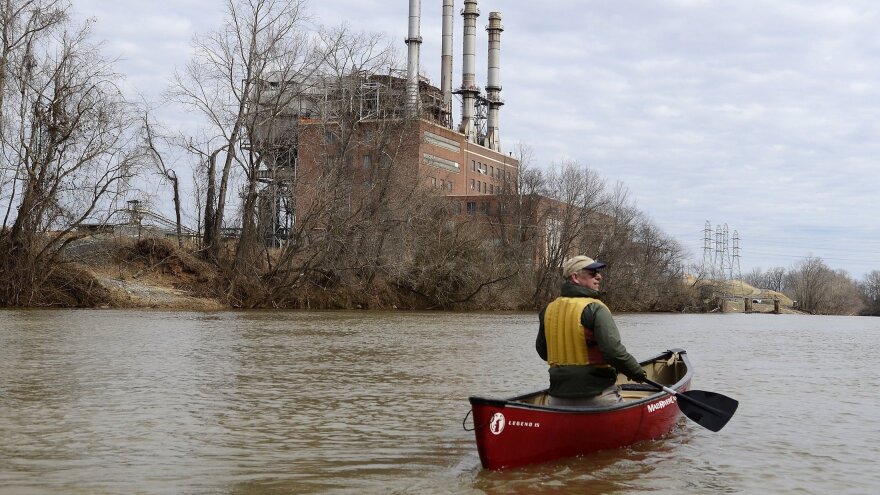When utility companies burn coal to make electricity — and it generated 39 percent of U.S. energy in 2013 — it leaves behind ash that can contain arsenic, selenium, boron and many other toxic substances.
For decades, that ash simply has been buried in pits near the power plants and covered with water. Now, in North Carolina, it's become a multibillion dollar problem. After a massive spill into the Dan River last year, the state ordered Duke Energy to clean up more than 100 million tons of stored coal ash, and the company has drawn up a plan that involves transporting it to two abandoned clay mines in Lee County.

But the local community and some environmental activists are fighting that proposal.
Lynn Petty, a retired postal worker here, trudges through knee-high grass surrounding the Mt. Calvary Baptist Church in Sanford, about 40 miles southeast of Raleigh. Behind the modest brick sanctuary, his ancestors are buried in the Carolina clay.
"Water comes down to here, won't soak in, makes a hole," Petty says. "Look, see what I'm saying — my daddy is buried right there, so I'm always here. I know this."
The nonabsorbent quality of the clay in the area is one reason Duke Energy and its contractor bought the Cherokee Clay and Brick mine across the road, and another in the next county over.
The plan is to dig up about 10 million tons of coal ash at 14 of the most critical sites across the state and bring it here on trucks and rail cars to a dry, lined landfill. The clay, they say, adds another layer of protection against leaks.
Petty just inherited 30 acres within sight of the mine, and he's afraid the coal-ash means he will never get to pass the land to his children.
"To me it's a socioeconomic discrimination at the highest, because they brought all of this in, dumped it on a poor, black neighborhood, when you got the governor and all these people staying in these big homes in cities like Raleigh and Charlotte," he says. "But they bring it here to a little poor country place like this and dump it on us."
Duke Energy is the largest electric utility company in the country. After the spill last year that coated 70 miles of the Dan River in coal-ash slurry, the North Carolina General Assembly passed a first-ever statewide law requiring a coal-ash cleanup effort. That will start with identifying the most dangerous sites and devising long-term storage plans.

Jeff Brooks, a spokesman with Duke Energy, says the two abandoned clay mines are crucial to that.
"We've only got five years to move these high-priority sites, completely close these sites, and so we have to begin to move ash now," Brooks says. "If we don't start with real applications that are available today, we'll never make that timeline."
Grassroots environmental groups and local residents are fighting back, saying the coal ash will harm drinking water, real estate values and economic development. They have held rallies and put pressure on local elected officials to file a lawsuit.
"You know Duke is smart — they got a lot of engineers that work for them," says Therese Vick of the Blue Ridge Environmental Defense League. "This is a cheap and dirty, almost old-fashioned, solution. And you're just moving a problem from one place to the other."
But that opinion is not universal among environmental groups. Frank Holleman, a senior attorney with the Southern Environmental Law Center, is no friend to Duke Energy — he sued the utility and the North Carolina Department of Environment and Natural Resources over coal ash. But he says the company's solution is better than the status quo.
"An old mine site which has already been disturbed could be a good place, and clay, water goes through it less easily than regular soil, so it can be even an extra protection," he says. "So that kind of approach can be a good approach."

Holleman says speed is the key, because leaving the coal ash in place isn't an option. By Duke Energy's own estimates, about 3 million gallons a day of tainted water seeps out of coal ash pits and into the state's rivers, lakes, and drinking water.
"In effect we're having a spill every day in North Carolina," Holleman says. "All 14 of these sites are leaking — some of them staggeringly."
Duke Energy says it could start moving coal ash 60 days after the permits are approved by the state.
Copyright 2020 North Carolina Public Radio. To see more, visit North Carolina Public Radio.

